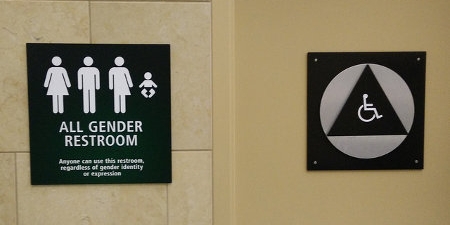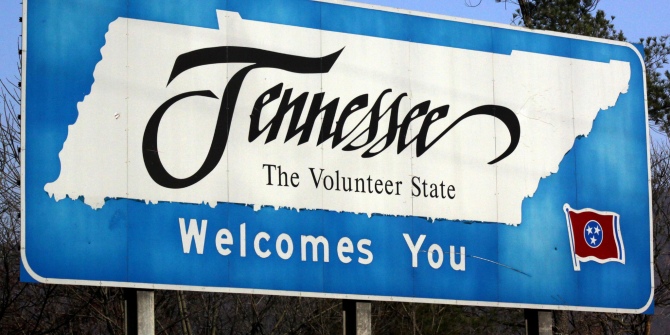USAPP Managing Editor, Chris Gilson, looks at the week in US state blogging. Click here for our weekly roundup of national blogs.
Northeast
On Wednesday, NH Journal says that state Democrats have been criticising GOP Governor Chris Sununu’s new budget for not choosing to fully fund the state’s Alcohol Fund, which supports efforts to combat the state’s opioid crisis. They comment that the criticism is interesting – given that previous Democratic governors didn’t fully fund the Alcohol Fund either.
Moving on to the Green Mountain State, VTDigger looks at Vermont families who are supporting their Canadian neighbors who have not been allowed to cross into the US by providing their families with gifts and toys.
RIFuture this week says that the state’s Congressional delegation was confronted by 1,000 constituents in a “raucous” town hall. Constituents vented their anger for 90 minutes on the Trump administration as well as threats to repeal Obamacare.
Over in New York, State of Politics reports on comments from Democratic Governor, Andrew Cuomo that the state “clearly” has the authority to block a 5 cent plastic bag fee from taking effect in New York City.
In the Garden State, Save Jersey complains that the state is unable to properly pay for New Jersey’s roads, but it can afford to fund its Sanctuary Cities. State Republicans are concerned that the move could cost as much as $15 billion in reimbursements to cities for any hypothetical loss of federal funds initiated by the Trump administration. Staying in New Jersey, Blue Jersey has the news that GOP Governor, Chris Christie, has vetoed a bill which would limit the police practice of asset forfeiture, after it passed through the state Senate and Legislature with unanimous votes in favour.
South
On Tuesday, Blue Virginia reports that US Representative Tom Garrett tried to avoid his constituents by holding a virtual “town hall”. They say that it did not go well, with a frozen live feed, and Garrett’s refusals to meet constituents in person.
Heading south, NC Capitol Connection writes that state Democrats have floated a bill to repeal HB 2 – the state’s infamous “bathroom bill”, but that Republicans have said that there will be no compromise, arguing that it would allow heterosexual men to access women’s bathrooms.
Continuing down to the Sunshine State, Saint Peters Blog says that the Florida Bar will oppose new legislation which would allow state lawmakers to override court decisions which they disagree with.
Carrying on the theme of Congressional representatives meeting (or not) with their constituents, Left in Alabama writes that Congressman Mo Brooks has defended his reluctance to hole a “town hall” meeting with the explanation that constituents can always meet him in private. They argue that meeting one’s member of Congress is emphatically not private business, and that by not wanting to meet with their constituents in a public forum, they are not serving the public interest. Staying in Alabama, Yellowhammer reports that the new state Attorney General, Steve Marshall, has stated that he will recuse himself from a case involving the Governor, Robert Bentley. The investigation concerns accusations of corruption and the misspending of state dollars, and has already led to impeachments proceedings from the state House.
In Arkansas, Talk Politics says that Governor Asa Hutchinson has once again stated his opposition to a “bathroom bill” which would limit the ability of the transgendered to use bathrooms.
Midwest
Ohio’s Plunderbund this week says that while the rest of the country is distracted by the antics of Donald Trump’s administration, the state’s Republicans have introduced a bill which would introduce “right to work” laws into the state’s public sector. This would in turn undermine the funding of public sector bargaining groups, in effect bleeding them to death over the long term.
With a very similar headline, Eclecta Blog writes that Michigan’s Republicans are “poised” to add $1 billion to the state’s budget by reducing the state’s income tax from 4.25 percent to 3.9 percent. With the state GOP claiming that the tax cut won’t hurt education funding, that means that infrastructure, healthcare and social services spending could be under threat.
Illinois’ Capitol Fax reports on Governor Bruce Rauner’s recent budget address, in response to the state Senate’s “Grand budget bargain” attempt, where he called for a permanent freeze to property taxes and a stepping down of proposed income tax increases. Rauner also rejected the state Senate’s proposed sales tax on food and medicine.
Over in the Hawkeye State, Blog for Iowa says that state Republicans have no idea what’s actually in their “union busting bill”, proving that it was written for them by ALEC.
Moving on to Minnesota, Bluestem Prairie looks at a new House GOP bill which would allow insurance companies to deny the health coverage to those seeking transition-related care.
North Dakota’s Say Anything Blog describes what they reckon is the legislation that the state should have passed in response to the anti-Dakota Access Pipeline riots, rather than the three bills passed this week by the state Senate. For them, they should have enacted laws which would allow the state to sue the protestors for safety costs related to the protests.
West and Pacific
Blog for Arizona writes that the state’s Supreme Court has agreed to hear arguments by the state’s Chamber of Commerce that the new voter-approved minimum wage proposition violates Arizona’s Constitution. The Chamber’s arguments will center on the Arizona Constitution’s requirement that any new voter-mandated spending must also designate a funding source to cover costs.
Moving on to Wyoming, WyoFile reports that Governor Matt Mead has stated that the state legislature’s proposed budget cuts aren’t necessary, and could slow efforts to diversify the state’s economy. Last year the state cut $84 million in spending to the 2016 budget session, in addition to $250 million in cuts made by Mead in June.
Heading to Idaho, Eye on Boise has the news that a bill which would limit early voting statewide just barely made it out of the State House State Affairs Committee. The bill would limit early voting to from one week before the election, down from three.
Oregon Catalyst says Tuesday that Governor Kate Brown’s pledges on transparency have been clouded by how she governs, given that she apparently dragged her feet on revealing her own misuse of state credit cards.
California has been in the news lately because of concerns about the potential for the Oroville Dam to collapse. Fox & Hounds says that the near disaster might focus the Golden State’s legislature into focusing on creating a package for needed infrastructure improvements.
Honolulu Civil Beat this week looks at why so many of Hawaii’s judicial nominees are men. They write that in part it’s down to that there are more male than female attorneys in the islands, and that more men tend to apply for judge jobs.
______________________________________
Featured image credit: Jay Phagan (Flickr, CC-
Please read our comments policy before commenting.
Note: This article gives the views of the author, and not the position of USAPP– American Politics and Policy, nor of the London School of Economics.
Shortened URL for this post: http://bit.ly/2lHf483






